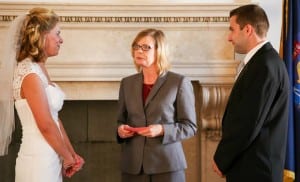MAINE WEDDINGS: THE LEGAL ISSUES OF MARRIAGES
Like everything else, Maine weddings have certain legal requirements that engaged couples should consider as part of their planning (OK, not the most exciting or fun part of the planning!). But knowing the legalities of getting married and the requirements for a marriage license well before the wedding will be one less thing to worry about as the big day approaches!
Step 1: Do You Need a Prenuptial Agreement?
A prenuptial agreement is a contract that couples may enter into before they are married, to set forth such things as how the couple’s assets will be divided upon divorce, and how much spousal support a partner may pay as part of any future divorce settlement. Although it may seem somewhat less than romantic to be discussing, even before the wedding, what will happen in the event of a divorce, prenuptial agreements can minimize financial risk and can simplify the divorce process in the event the marriage does not work. Prenuptials are especially important for couples entering a marriage in unequal financial positions.
Prenuptial agreements are not exclusively for divorce pre-planning; the bride and groom can also use a prenuptial agreement to establish financial plans and practices that they will observe in their future marriage, including money management, occupational goals, and budgetary policies.
Generally speaking, the more assets one has to protect, the more likely it is that a prenuptial agreement should be considered. A couple should speak with an attorney or financial professional about the need and benefits of a prenuptial agreement. Attorney Molly Watson Shukie can assist in drafting a prenuptial agreement that conforms to the parties’ needs.
Step 2: The Marriage License
A couple will need a marriage license. Maine marriage licenses are issued at the municipal (city/town) level of government. Both the bride and groom must visit one of their city/town halls to apply in person for the license. The municipal clerk will witness the bride and groom’s signature on the marriage license/certificate of marriage form; the person performing the wedding ceremony (discussed below) will complete and sign the marriage license/certificate after the ceremony. (Once complete, the license form becomes the marriage certificate). If both the bride and the groom are Maine residents, but live in different cities, they may apply in whichever of the two cities is most convenient, as long as one of the spouses is a resident of the city. There is no need to apply in both municipalities. If only one is a Maine resident, apply at that resident’s municipality. If neither party to a marriage is a Maine resident, the couple may apply at any Maine municipal office, and then they can legally marry in Maine.
If a Maine couple is married outside of the state, they must follow the laws of the wedding destination, and then their marriage is legally recognized upon their return to Maine (unless the marriage violates any Maine marriage laws, however, such as Maine’s prohibitions against polygamy). A copy of the marriage certificate should then be filed with the municipal office of the couple’s residence.
For first-marriage couples over 18 years old, all that is needed to obtain the license is a photo ID for each, such as a drivers’ license, state ID, or passport. If the marriage is not a first marriage for either party, a certified copy of the divorce decree or death certificate for any prior marriages must be provided to the municipal clerk before a marriage license can be issued. If these documents are not readily available, they may be obtained from the appropriate government offices. For example, a certified copy of the divorce decree can be obtained from the court that granted the divorce, and a death certificate can be obtained from the vital records department at the City or Town Hall of the decedent’s last residence. These documents should be obtained well in advance of the wedding, as it could take a few weeks or more, depending on the court or municipality.
Unlike most other states, Maine does not require any blood testing before couples may obtain marriage licenses (some states require blood tests, to rule out certain genetic disorders, for example). A marriage license expires after 90 days, so do not obtain the license too soon before the marriage ceremony! Also, unlike some states, Maine does not impose a “waiting period” from when the license is issued until the wedding day). Still, do not wait until the last minute either, particularly if documentation regarding prior marriages need to be obtained.
Step 3: The Ceremony
The ceremony or exchange of vows must be performed in the presence of at least two witnesses, other than the person officiating the wedding. Typically, the two witnesses are the best man and the maid or matron of honor.
In Maine, marriages may be performed by ordained ministers and other licensed clergy, as well as Maine judges, lawyers, or notaries public. In addition, out to sea, a boat captain can officiate marriages. After the ceremony, the completed marriage license and certificate must be filed with the same municipality that issued this form. The couple does not need to worry about filing the completed marriage certificate with the municipal office that issued the license, because the person who officiates the wedding is the only party that can file the certificate. Most wedding officials will obtain a certified copy of the completed, filed, marriage license certificate for the newly-weds. If not, the couple can obtain a certified copy (with a raised municipal seal) of the form from the same municipality that issued it, either by visiting the municipal office, or by requesting the form by mail. The cost for obtaining a certified copy of the marriage certificate from the municipality is generally $15.00. If requesting the copy by mail, you should include a self-addressed, stamped envelope for the clerk’s use in sending the copies to you. Another option, in some locales, is for the couple to request, at the same time as when they apply for the license, that the town clerk mail a copy to their home, once the officiant files the form after the wedding; the couple could pay the additional fee at that time, and save a post-wedding step.
Step 4: Changing Your Last Name (if you so choose)?
After the wedding, if the bride wishes to change her name to her husband’s (or vice versa), she should notify all financial institutions, government agencies (such as the Social Security Administration and the Department of Motor Vehicles), and other entities with whom she does business (employers, memberships, professional organizations, etc.). Depending on the organization, this may be accomplished with a simple telephone call or email. For governmental or financial agencies, however, one may be asked to provide a photocopy or a certified copy of the certificate of marriage. Additional certified copies of the marriage certificate can always be obtained from the municipality that issued the license, as discussed above. To ensure a seamless name change, make a list of all organizations where your records must be changed, and call each entity to find out exactly what is needed to change each record. Create a change of name notification form that can be re-used as necessary. The form should state your account number, if any, your prior name, your new name, the effective date of the name change (i.e., the wedding date), and contact information where you can be reached should more information be required.
Although it is much more exciting to focus your attention on finding the most beautiful wedding dress, the most elegant cake, and planning a romantic honeymoon, discussing the legal aspects of tying the knot is a critical step in making sure the wedding day is perfect and the marriage gets off to a great start.
This article is not legal advice but should be considered general guidance in the area of marriages in Maine.

